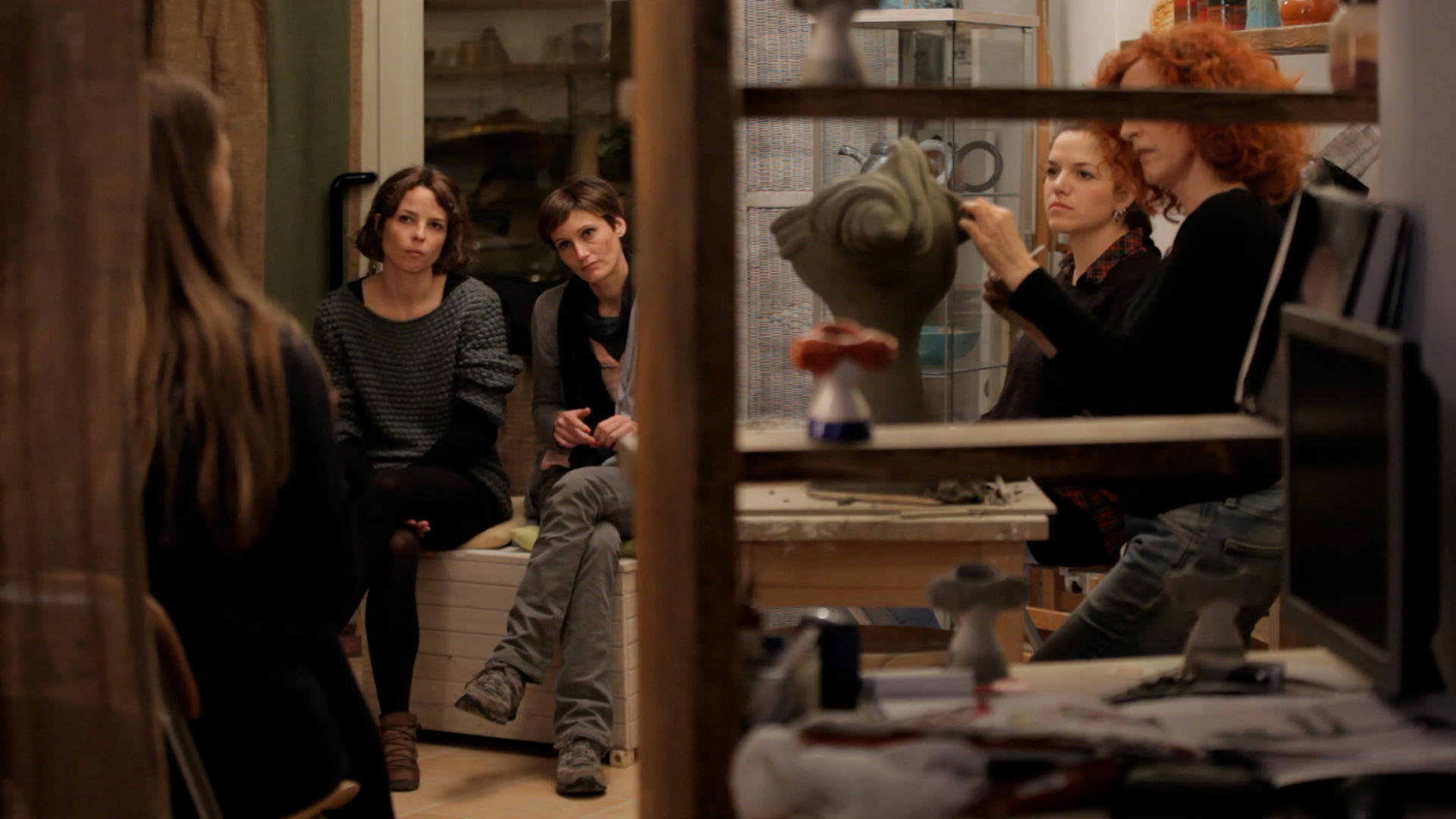Il cerchio delle ceramiste: "Sulla mistica della maternità"

Donne di ispirazione start 00:55:45end 00:59:04 Parlando delle personalità che le hanno ispirate, Miriam evoca le femministe degli anni Settanta, mentre Maria menziona i personaggi femminili dei romanzi di Jane Austen, Jane Eyre di Charlotte Brontë e il grande Lebowski, come antieroe maschile.trascrizione MIRIAM: "Se dovessi avere una tipologia di donna alla quale ispirarmi forse eleggerei, appunto, quelle donne che sono riuscite a portare avanti la lotta per l'emancipazione, negli anni Settanta, dagli anni Settanta in poi, insomma, forse anche un po' prima, che sono donne che comunque sia hanno avuto anche l'esperienza di lavorare, di portare avanti delle lotte e nel frattempo essere anche madri, a volte, altre volte no. Però, insomma sono donne che hanno segnato sicuramente la storia e anche la nostra, che siamo magari venture, e quindi abbiamo appunto la possibilità di poter parlare dell'aborto, vedendolo come una cosa se ancora da considerare o meno un tabù, quindi sicuramente... e come questo tantissimi altri passi avanti. Però, ecco, sono donne forti che io prenderei ad esempio."
MARIA: "In realtà, ci stavo pensando da poco, perché sto pensando a dei libri per Pietro e quindi ho pensato ai libri che mi ricordo, i primi romanzi e le cose che mi hanno appassionato. Io ho avuto proprio un innamoramento per Jane Austen, ho letto tutto, e in realtà, a ripensarci i personaggi di Jane Austen molto spesso erano queste donne molto, diciamo, con la parlantina, con la risposta pronta, un'intelligenza brillante, anche un'ironia, un'autoironia, insomma così, e anche un po' appunto non poi, alla fine, obbedivano alle regole, non è che proprio erano strane, però, insomma, avevano dei guizzi e mi piacevano da morire. E quando poi ho incontrato Jane Eyre il libro [di Charlotte Brontëquello e stato per me, quasi, un turbamento, perché lì andava oltre. Cioè, quella era una che appunto senza famiglia, in un orfanotrofio, poi diventa... cioè, lavorava, prima di tutto lavorava, lavorava, non dipendeva da nessuno, non è che era la moglie, la figlia di nessuno, addirittura si innamora ma poi però scappa, si ricostruisce una vita e diventa maestra, quindi, ecco, un personaggio del genere io mi ricordo che è stata proprio una finestra che a me si è aperta e che mi piacque tantissimo e adesso a ripensarci magari ci ritrovo tante cose che ai tempi non sapevo, cioè, magari c'erano ma non gli davo un nome, non le sapevo, però insomma magari ce le avevo dentro già e quindi, quello. E poi io ce l'ho un grande riferimento, però non è femminile, anche se secondo me è un antiuomo, diciamo un antieroe maschile che è il grande Lebowski, Jeff Bridges. Ecco e quindi, quello secondo me è un antiuomo molto simpatico, in ciabatte e asciugamano, ecco io mi rispecchio molto in quello, sarò strana però a me piace...white russian per tutti."
English:
MIRIAM: "If I had to choose a group of women to take inspiration from, I'd say the ones who fought for their empowerment, like women from the 70s. Maybe a little bit earlier. Those women had the chance to work, to fight for their rights and to be mums at the same time, even if not always. But those are women who made their mark on history, on our history because we're their future and we have the chance to talk about abortion and whether it is a taboo or not, so surely this and others aspects are a step forward from there. These are strong women I'd take as an example."
MARIA: "Actually, I was thinking about it. I was thinking about some books for Pietro, and I remember the first novel I've read and what thrilled me. I fell in love with Jane Austen's books, I've read every novel. If I think about Austen's characters, they are women who really like to talk, with a ready answer, extraordinarily intelligent and ironic, and they're able to laugh at themselves. They obeyed the rules in the end, they weren't that weird, but they have some attitudes I really like them. But then I read Jane Eyre, that was for me really shocking, because it was different. She didn't have a family, she used to live in an orphanage. Above of all, she worked, she worked and was independent, she wasn't the wife or the daughter of someone, then she fell in love but then she ran away, she built her own life, and then she became a teacher. Such a character I remember she was like something new to me, and I really loved her and thinking about it, there are a lot of things that I didn't understand back then. Maybe I didn't know what they were, I wasn't fully aware about them. That's what It think. Another great influence, but he's not a woman, I think he's an anti-male character, a male antihero. He's the big Lebowski, Jeff Bridges. an anti-male character, I think he's a very funny with sandals and a bathrobe. I really identify with him, maybe I'm weird but I like him. White Russian for everyone!"]]>soggetto femminismo emancipazione anni Settanta persone citate Bridges, Jeff (attore) [persona citata] Brontë, Charlotte (scrittrice) [persona citata] Austen, Jane (scrittrice) [persona citata]
